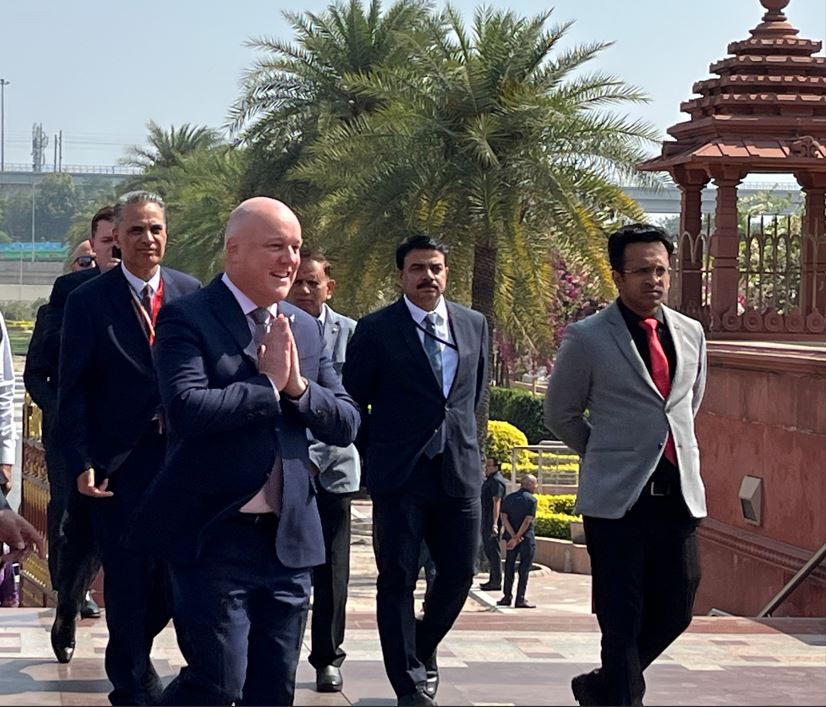During Prime Minister Christopher Luxon’s recent visit to India, he was questioned by both the Indian and traveling media about why his government hasn’t acted against Khalistan protesters disrupting New Zealand’s peaceful Indian community. Luxon defended his government’s position, emphasizing New Zealand’s strong free speech laws and the right of people to express their views without fear of intimidation.

When asked about the “Kill Modi” chants on the streets of Auckland, Luxon continued to defend it as part of free speech. However, this raises concerns about the consistency of New Zealand’s approach to free speech and hate speech. If such extreme rhetoric is allowed as free speech, why isn’t it considered hate speech, particularly when it leads to division? This shows a clear double standard in how New Zealand treats free speech and hate speech. Hate speech, after all, is hate speech, whether directed at one’s own people or others.
In a related issue, a Labour MP recently commented on a report regarding harassment faced by female parliamentarians in New Zealand. Conducted by the University of Otago’s Department of Psychological Medicine, the study involved interviews with 11 women MPs across various political parties. The findings revealed disturbing accounts of threats, including rape and death threats, and assaults with weapons. The MP expressed concern, noting that the situation has worsened over time. The report highlighted that much of this harassment is tied to hate speech and violent language, not free speech. Abuse against women MPs goes beyond online harassment and extends to face-to-face encounters, often targeting their gender, appearance, or race, rather than their political views. This is not free speech—it’s hate-speech, as many women have faced serious threats such as bomb threats and physical assaults.
A key finding of the report was the role of social media in normalizing abuse. The anonymity and disinhibition of online platforms allow violent and misogynistic language to proliferate, especially against female MPs. It also affects their families and staff, with many MPs reporting regular harassment. The rise of far-right ideologies, imported from overseas, has contributed to the polarization and aggression seen in New Zealand. Women MPs, particularly those who are ethnically different from the majority Pākehā population, are the primary targets of this sustained, deliberate abuse, which is aimed at undermining their confidence and driving them out of politics.
The report also revealed that harassment intensifies when women hold senior roles in government, becoming more personal and frequent. This isn’t just about individual suffering; it’s a challenge to political representation and democracy. Some women MPs have considered retiring due to the abuse, with a few admitting they might have reconsidered entering politics if they had known the extent of the harassment. The abuse has also taken a toll on their mental health, with some MPs reporting flashbacks and even suicidal thoughts. This harassment challenges the democratic principle of equal political representation and weakens the fabric of democracy itself.
Professor Susanna Every-Palmer, the senior author of the study, emphasized the profound psychosocial impact of such harassment. The research recommended several measures to address the issue, including the creation of a central body to monitor and respond to abuse. It also called for updates to New Zealand’s Harmful Digital Communications Act to better address online harassment and ensure that social media platforms are held accountable for preventing abuse. In addition, the report advocated for new legislation requiring social media providers to address and prevent online abuse, supported by strong enforcement measures.
Unfortunately, New Zealand’s response to hate speech and harassment seems inconsistent. Whether it’s protecting politicians from threats or ensuring free speech doesn’t cross into hate speech, there’s a clear need for a more balanced approach. The issue goes beyond individual rights; it’s about preserving the integrity of democratic institutions and ensuring that all citizens can participate in political discourse without fear of harm. -TIN Bureau



